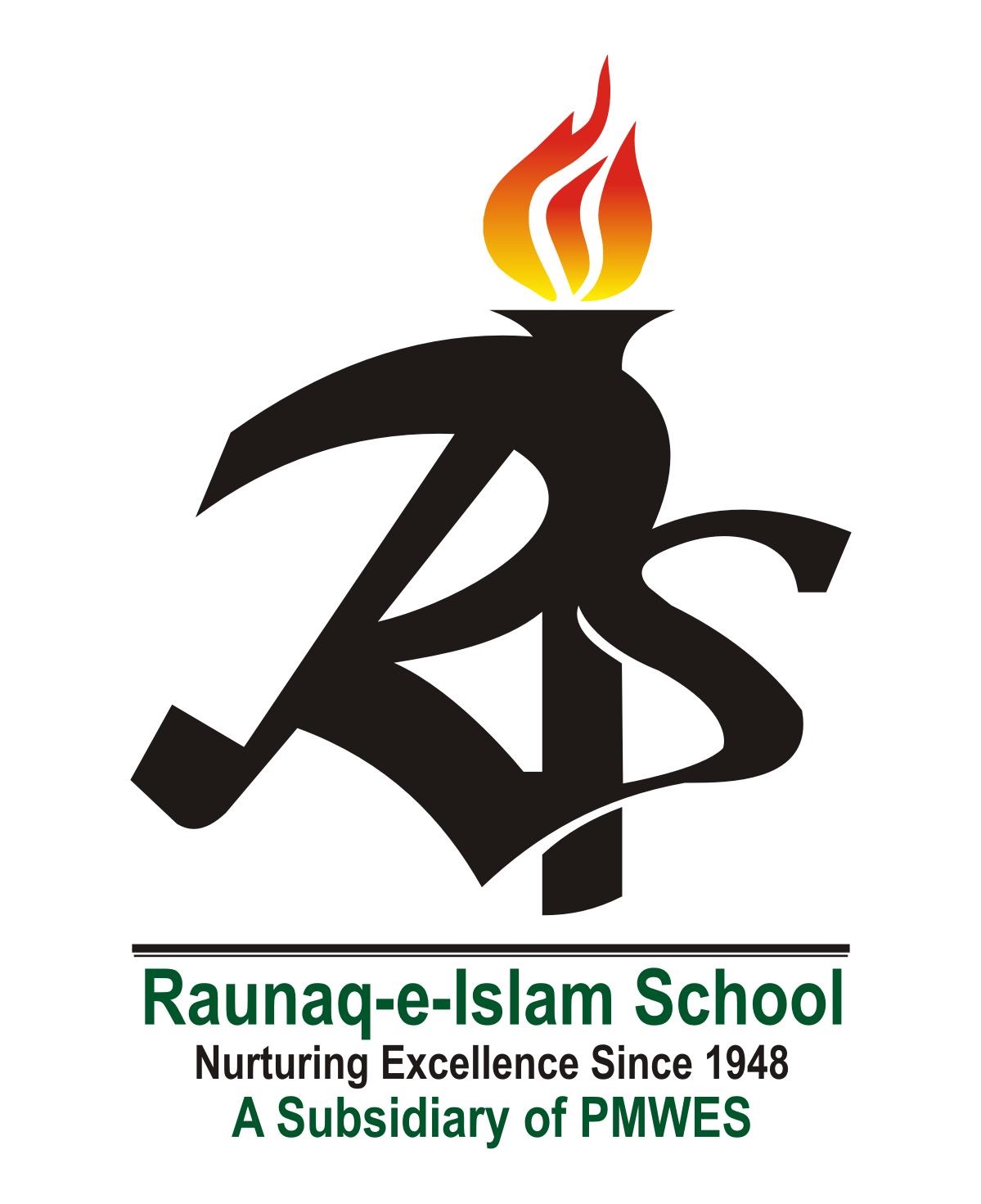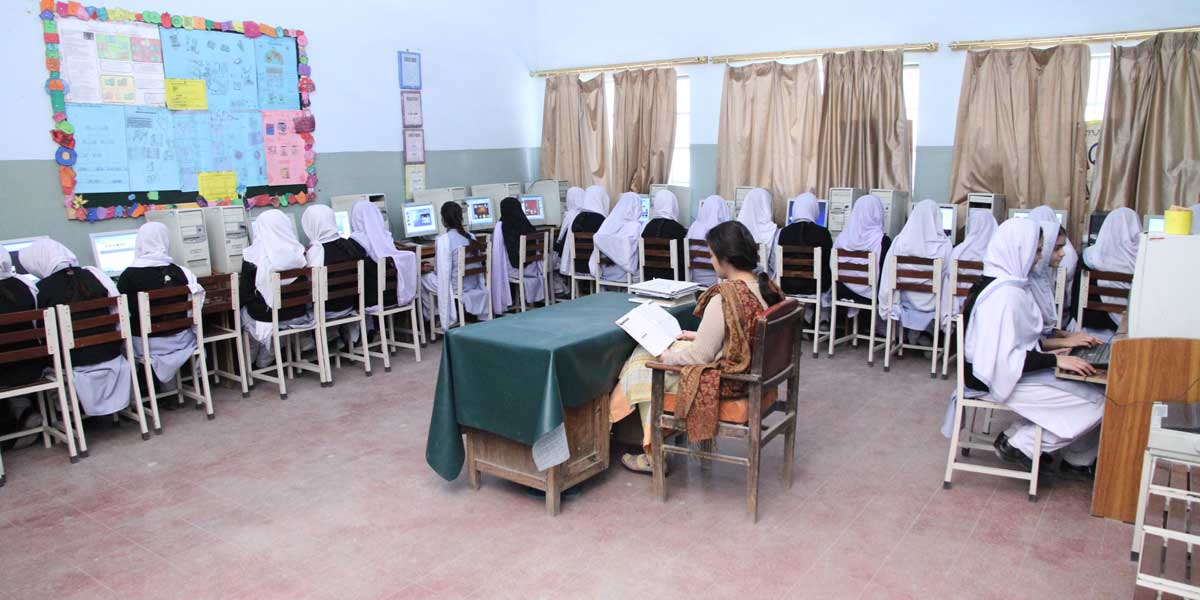
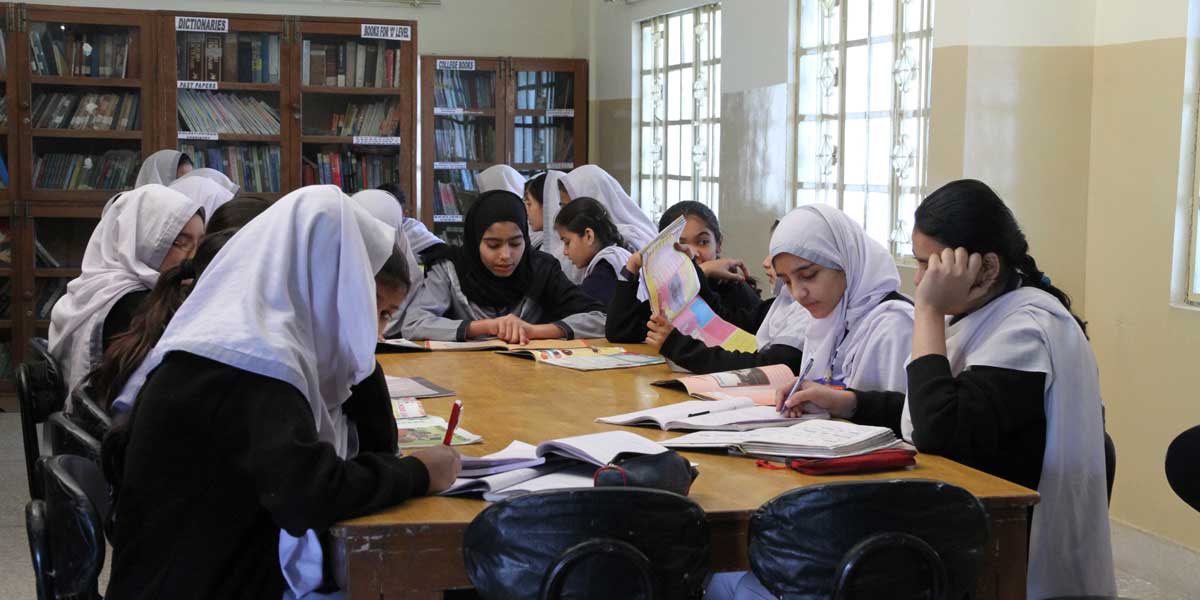
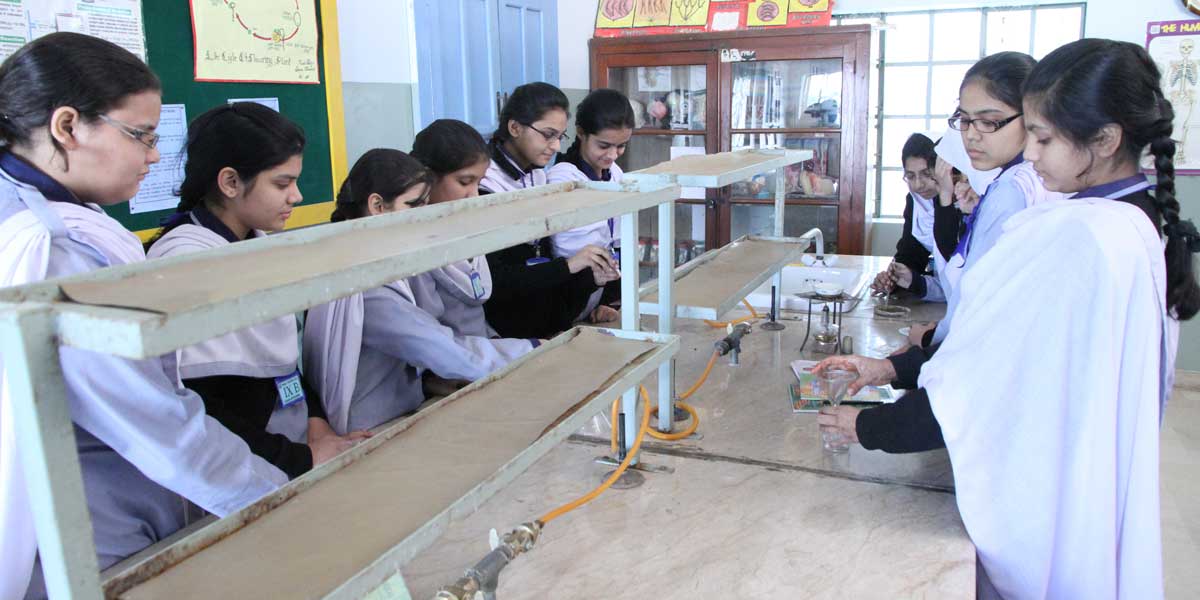
Website of Raunaq-e-Islam School is currently Under Construction.
About Raunaq-e-Islam School System
The story of The Pakistan Memon Women Education Society (PMWES) begins with the efforts and dedication of Khadija Hajiani, popularly known as Khadija Maa. She had no formal education; she belonged to a middle-class family having limited financial resources.
It was in early 1948 when Khadija Maa led a group of Good Samaritan women to the Governor House Karachi to meet Quaid-e-Azam Mohammad Ali Jinnah. As the Quaid was not present in the Governor House, his sister Fatima Jinnah gave audience to the delegation. The delegation briefed Ms Fatima Jinnah about their plan to promote women education by launching girl-specific schools and the need of cooperation from the government.
Ms Jinnah was so much impressed by the zeal and seriousness with which the women wanted to work on the vital sector that she called officials of the education department and issued instructions to them arrange a building on a priority basis for the ladies to launch the project.
Within a few weeks, the government arranged a building at Nankwada, Karachi, and informed Khadija Maa about it. In the meanwhile, she had formed The Pakistan Memon Women Educational Society (PMWES), which took over the building and opened the first Raunaq-e-Islam Girls Primary School in it without wasting time. In the same year, she succeeded in getting another building in Kharadar for opening the second girls’ school.
On the one hand, Khadija Maa continued working to open new schools and on the other strenuously struggled to change the perception of local communities about the importance of women education for the betterment of society. It was because of her relentless efforts and commitment that a good number of people enrolled their daughters in these schools within a short period of time.
In 1964, the PMWES bought a 1.5-acre plot in F.B. Area and established a building and started the third school there the following year. In the same year, the society acquired a palatial building in Old Town and set up the first Raunaq-e-Islam Girls College there. By then, the total number of students in these institutions had reached 4,000.
Unfortunately, however, the government of Zulfikar Ali Bhutto nationalized all schools and colleges in Pakistan in 1973. This anti-education moves of the Bhutto government pushed the education sector far behind.
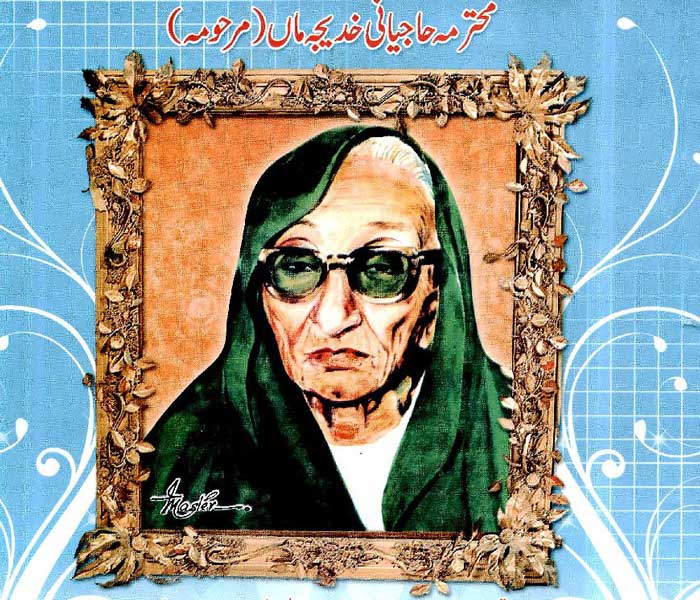
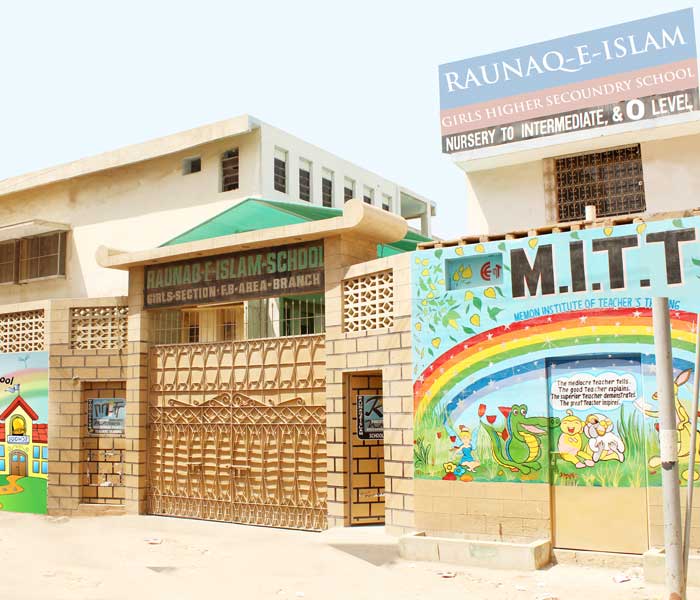
In 1985, considering the deteriorating level of education in the aftermath of the nationalization of schools and colleges, the Zia government denationalized the community schools and handed them over to their owners.
Khadija Maa was fortunate to take possession of all the schools except the college which was not given back to her by the military government.
Khadija Maa passed away on December 18, 1990, at the age of 90 years, leaving behind the purposeful institutions for the benefit of the nation.
History Timeline
- 1948: Khadija Hajiani Maa established the first girls’ school at Nanakwada, using a building provided by the Evacuee Trust. The premises had been abandoned by a minority family that migrated to India, and the initiative was taken on the advice of Mohtarma Fatima Jinnah.
- 1948: Later that same year, Khadija Hajiani Maa founded a second girls’ school in Kharadar, again utilizing a building made available by the Evacuee Trust.
- 1951: The Pakistan Memon Women Educational Society (PMWES) was founded under the leadership of Khadija Hajiani Maa to oversee and manage the growing network of schools.
- 1964: PMWES acquired a 1.5-acre plot in the F.B. Area and constructed a large school building. The third girls’ school was inaugurated there in 1965.
- 1965: The Society also purchased a sizable building in the Old Town area, where it established Raunaq-e-Islam Girls College.
- 1973: The Government of Pakistan nationalized all private schools and colleges, taking over control of all educational institutions, including those run by PMWES.
- 1985: Due to a decline in educational standards, the government reversed its policy and began de-nationalizing community-run schools. The community schools were returned to their original owners, and Khadija Hajiani Maa successfully regained control of all the schools except the college, which remained under government control.
- 1990: Mohtarma Khadija Hajiani Maa passed away on December 18, 1990, leaving behind a legacy of educational institutions dedicated to empowering future generations.
- 2002: The Pakistan Memon Women Educational Society (PMWES) acquired Sarabai Hall in the Bantva Complex, North Nazimabad, and transformed it into Raunaq-e-Islam Sarabai School, offering the Cambridge curriculum. Simultaneously, a Cambridge section was introduced alongside the Matric system at the F.B. Area School.
- 2010: The Memon Institute of Teachers Training (MITT) was established at the F.B. Area campus. The institute provides a one-year Montessori Teachers Training Diploma and offers free courses for teachers from government and private schools. The MITT got accredited with STEADA (Sindh Teachers Education Development Authority) and affiliated with SBTE (Sindh Board of Technical Education) (Missing content added)
- 2012: Raunaq-e-Islam Girls Higher Secondary School was launched at the F.B. Area campus to provide Intermediate education, with a vision to establish a Degree College for girls in the area.
- 2013: Annual free teacher training sessions were initiated at the F.B. Area campus, benefiting over 300 teachers from Basic Education Community Schools (BECS) operated by the Federal Government in Karachi’s suburbs.
- 2015: The Society launched Raunaq-e-Islam Neighborhood Schools in Karachi’s underserved suburbs. These initiatives focus on educating children who would otherwise be on the streets or assisting their families. Currently, 10 schools operated by the society in different Goths (villages) of Gadap Town, Orangi Town, Baldia Town, Fareed Colony, Kemari Town of Karachi. Students of Raunaq-e-Islam Neighborhood School Projects provided free of cost education, textbooks, stationery, and uniforms by the society. Currently, approximately 1,100 students are studying in all the neighbourhood campuses.
- 2021: The Society collaborated with Commonweal Communications to establish an English Language Centre at Sir Adamjee Institute, enrolling over 100 students.
- 2023: In partnership with the Institute of Holistic Rehabilitation & Inclusion (IHRI), the Society began supporting approximately 700 children with disabilities at Al Salama Hospital, Baldia Town center. These children receive physiotherapy, speech therapy, occupational therapy, medical care, and education.
- 2024: Vocational training programs were introduced for secondary-class students, including courses in Arts, Fashion Design, Dressmaking, and Computer Skills. These programs empower students to assist their families financially while continuing their education.
- 2025 (Upcoming): The Society plans to open vocational centers in Federal B Area, North Nazimabad, and Fareed Colony. These centers will offer training in Computer Skills, Fashion Designing, Dressmaking, Mobile Repairing, Motorcycle Repairing, and Solar Installation, preparing students for a future of self-reliance and economic contribution.
Vision
We envision an enlightened Pakistan where all individuals have the knowledge, skills, and opportunities to progress and prosper.
Mission
To provide quality education to all, without any discrimination of caste, creed, color, race, gender, or religion, to help develop their natural talents to their fullest.
Aims & Objectives
The core aims and objectives of the Pakistan Memon Women Educational Society (PMWES) include:
- Making quality education accessible to all
- Advancing women’s education and careers
- Fostering creativity and critical thinking
- Promoting use of innovative pedagogies
- Fostering meritocracy and collaboration
- Promoting peace, tolerance, and respect
Organization
These schools work under the management of Pakistan Memon Women Educational Society (PMWES)
Board of Management is comprised of:
- Mr. Gul Muhammad (President)
- Mr. Muhammad Rafique Moon (Vice President)
- Mr. Qasim Moosa Lawai (Hon. General Secretary)
- Mr. Zubair (Hon. Joint Secretary)
- Mr. Muhammad Amin Latif (Member)
- Mrs. Maimoona Usman (Member)
- Mrs. Farzana Qasim Lawai (Member)
School Management:
- Head Mistress
- Assistant Head Mistress / Senior Teacher
- Coordinators
- Teaching staff
- Non-teaching staff
Facilities Provided by PMWES
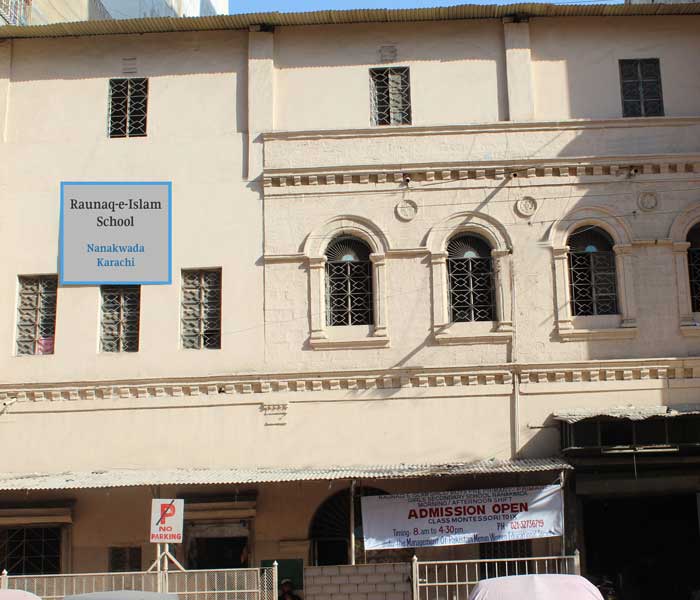
- About 200 Educators employed
- Education to approximately 3500 students.
- Books and uniforms provided for needy and talented students
- Scholarships for high achievers
- Awards for students and teachers
- Advance Training and Refresher courses for the teachers
- Regular English language classes
- Concession in fees
- New methodology of teaching
- Unique educational environment.
- Quality education for all at affordable price
- Spacious and well-equipped laboratories
- Library, Activity room and Audio-Visual room
- Co-curricular Activities
- Interest free loan to the teachers for higher education
- Standby Generator and Solar energy
